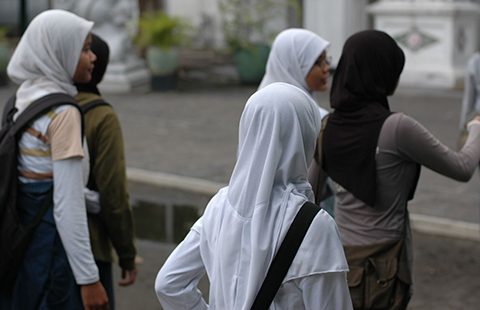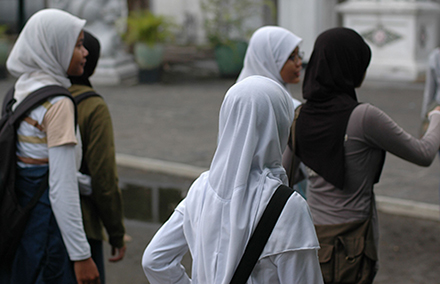While the royal houses of Japan and Thailand have agonised over the issue, one of the last kingdoms of Java has tentatively embraced female succession.
The sprawling kraton or palace compound in the heart of the city of Yogyakarta occupies a peculiar space in the modern Republic of Indonesia.
The vestige of the 260-year-old sultanate of Mataram, its ruler (currently Sultan Hamengku Buwono X) still automatically becomes Governor of the Special Region of Yogyakarta, an enclave in Central Java that is one of the country’s 33 provinces, the second tier of government. More than that, the kraton is the living concentration of all that is halus (refined) and noble for the Javanese, and by extension for Indonesia as a whole.
The unusual position of the Yogyakarta principality arises from the distinguished career of Hamengku Buwono’s father, Hamengku Buwono IX, who famously defied the Dutch when they occupied Yogyakarta in 1948 during the Indonesian revolution, and was later Vice President in the 1970s.
His province of Yogyakarta, of which he remained Governor till his death in 1988, was consequently designated a special province, and remains de facto the only one of the many principalities of the Dutch period which survives to the present day.
His son Hamengku Buwono X has also been a respected, stabilising figure in the turbulence of contemporary democratic politics.
But in mid-April this year the 69-year-old sultan caused a shock to accepted tradition. By effectively announcing his eldest daughter as his successor he caused an immediate and open split in the Yogyakarta royal family. All 11 of his younger brothers lined up to oppose him.
By Javanese tradition, succession passes to the eldest son of a sultan, but Hamengku Buwono’s problem is that his five children are daughters. In such a position, the normal assumption for many years has been that one of the sultan’s brothers would succeed him.
The sultan had previously taken steps to promote his daughters’ role and standing, but the exact timing of this move took most by surprise.
Hamengku Buwono X’s announcements in April included several obscure changes to his own style and titles. One of these was the omission of the Muslim title “Khalifatullah”, a title associated with male rulers. The more important announcement was the award to his daughter, the Ratu Pembayun, of the title of Ratu Mangkubumi, a title previously used mainly by male princes, including the present Sultan himself before he succeeded his father in 1988.
During the palace ceremony when Ratu Mangkubumi was invested with the title, she was invited to sit on the chair traditionally reserved for the Crown Prince of Yogyakarta. This was universally taken as a clear sign that she was the successor, although when questioned by the media, Hamengku Buwono averred that the succession could only be settled later and that the ceremony had not designated Mangkubumi as crown princess.
Hamengku Buwono X’s justifications for his actions were limited to assertions that he had received divine guidance, and that a sultan’s decrees were in any case absolute and unchallengeable. He added that he would shortly report on the changes to the Minister for Internal Affairs.
His opponents’ arguments were more varied, including that only a male could be Sultan and that the Sultan’s actions ran counter to the customs and traditions (paugeran) of the palace family.
More legalistically they argue that Hamengku Buwono himself became Sultan in 1988 complete with his traditional styles and titles, and had no right to change them unilaterally. Some critics even claimed that because of the changes, “we don’t have a Sultan any more”. It was pointed out that a 2012 law on Yogyakarta’s special status contained several clauses with the clear assumption that the Sultan would be male.
The issue of the 2012 law on Yogyakarta’s special status arose from uncertainty after the fall of President Suharto in 1998 about the exact “special” nature of the Special District of Yogyakarta in the new democratic Indonesia. The controversy sharpened considerably when then President Susilo Bambang Yudhoyono expressed doubt that an unelected leadership of one region was compatible with Indonesian democracy. The fiercely adverse Yogyakartan popular reaction was a factor in the eventual conclusion of the law of 2012, where the Sultan and Yogyakarta won the day, and traditional leadership was preserved.
Members of the extended family poured scorn in private on the Sultan’s claims of divine revelation. Several other criticisms also heard in private cast doubt on the proper intensity of the Sultan’s Muslim faith, or adverted to the claimed lack of popularity of the new Princess Mangkubumi and her husband, as well as casting aspersions on their business interests and alleged venality. Sometimes these criticisms descended into outright scandal-mongering. The critics added that the Sultan’s wife, Ratu Hemas, and his five daughters, had acquired too much influence over the Sultan.
The initial family reaction was led by the outspoken Prince Yudhaningrat, a son of Hamengku Buwono IX by a different mother from the current Sultan, who voiced some of the more public criticisms mentioned above.
Another branch of the family (by yet another wife of Hamengku Buwono IX) contains six sons, five of whom now live and work in Jakarta. Those five princes visited Yogyakarta soon after the controversy broke, met the Sultan and listened to his explanations, but told the media they were not convinced. This added to the public impression of a house divided.
A small scatter of anti-Sultan banners soon appeared on the streets of the city, reading kembalikan paugeran, or “bring back palace traditions”. To the extent that such phenomena represent public opinion, this relative scarcity compares to the last time Yogyakarta experienced an intensely local public issue.
This was in 2013, when the city was festooned with banners, frequently replaced, in support of Kopassus (Special Forces) soldiers standing trial in 2013 for storming the city’s Cebongan jail and murdering four civilians arrested for killing one of their comrades in a nightclub brawl.
A possible conclusion, necessarily tentative for the moment, is that many still regard the controversy as a matter for the palace family, which does not yet concern the ordinary citizen.
In the meantime, the Sultan embarked on a publicity campaign aimed at habituating the public to the Princess Mangkubumi’s new status. The main local newspaper Kedaulatan Rakyat carried an uncritical front-page interview with him, and the following day reported on a dance performance by Mangkubumi at the palace.
It is hard at present to draw firm conclusions, but the Sultan seems at the moment to have most cards in his hand, including incumbency as both Sultan and Governor, and the power of patronage. He may even be able to buy off some of the dissidents. More broadly however, a key disadvantage is that concentration on this contentious issue can distract the Sultan’s attention from his important duties as Governor.
In the medium term, such a severe and open disagreement can turn into a corrosive long-lasting feud, which risks damage to the prestige of the entire royal family – and to the Yogyakarta royal myth – as both sides try to discredit the other. At 69, the Sultan still seems fit and healthy, but his awareness of his own mortality must have contributed to the timing of this move. Nevertheless, it is possible to imagine a future when – without him – the remaining leaders of the palace family may move to reverse his recent decisions. Some relatives are already predicting this.
These events may well be the most dangerous medium-term development to date for Hamengku Buwono IX’s political legacy. In recent years, disputes over succession have hurt the image and prestige of the other prominent royal house of Java, that of Solo.
The survival of royalty in democratic systems has often depended on the maintenance of prestige and respect, and on the feeling that royalty, though exalted, still has concern for the common people. This is difficult to sustain when family members turn inwards and begin criticising each other, and damaging each other’s image thereby.
John Monfries is a researcher at The Australian National University’s College of Asia and the Pacific and author of A Prince in a Republic: The Life of Hamengku Buwono IX of Yogyakarta.
 Facebook
Facebook  Twitter
Twitter  Soundcloud
Soundcloud  Youtube
Youtube  Rss
Rss 

